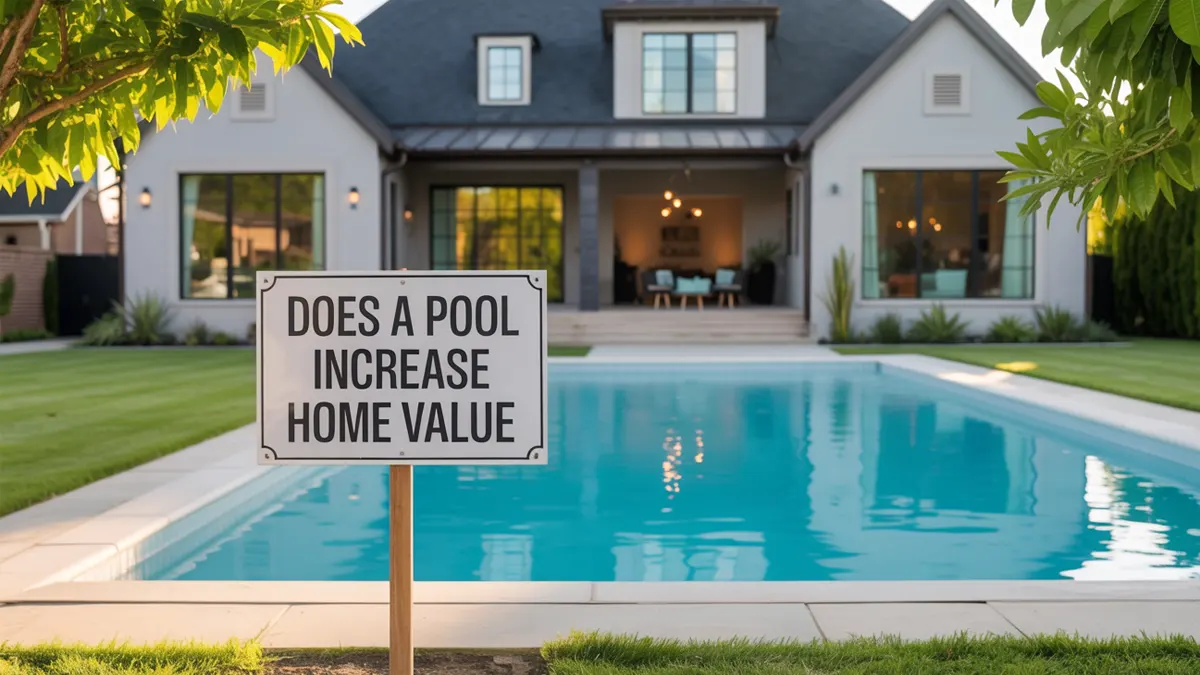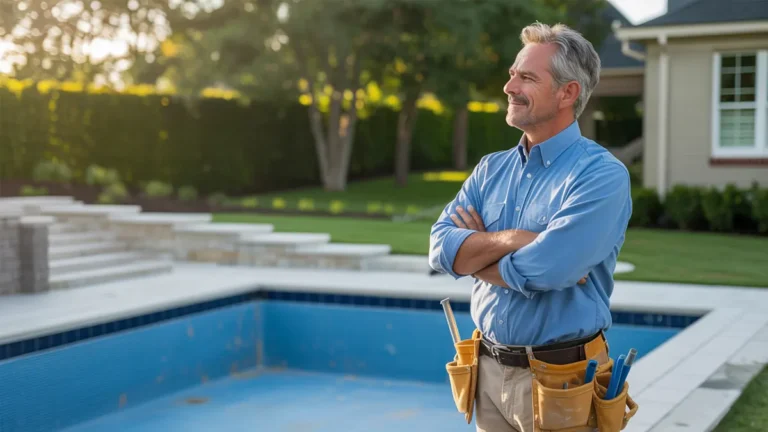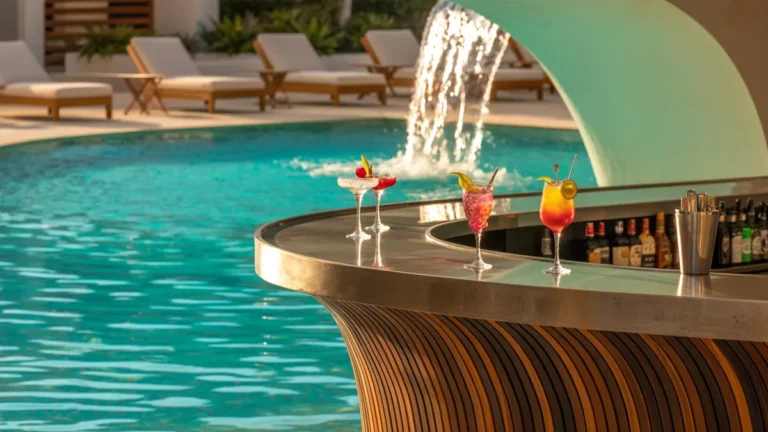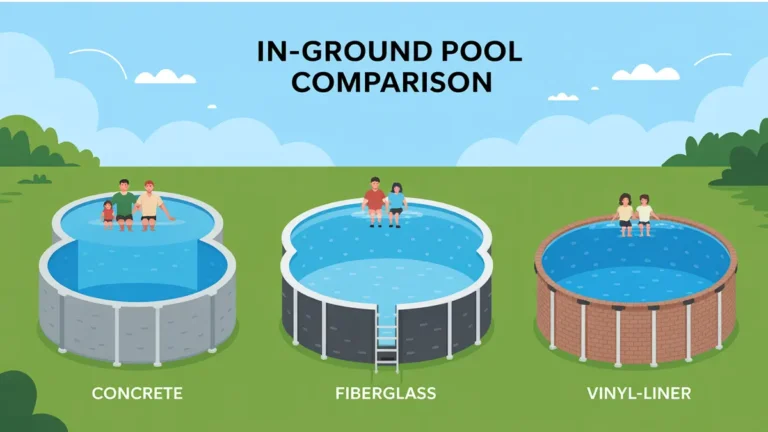Pools promise relaxation, luxury, and a perfect summer escape just steps from your door. But when it comes time to sell, the real question surfaces: Does that pool add value to your home, or is it just an expensive water feature? Before you take the plunge, let’s explore how pools impact resale value and why the answer isn’t as crystal-clear as you might think.
The response isn’t as black and white as a simple yes or no. While pools make a house more beautiful, there are several factors that determine if they indeed increase resale value. Let’s break down the bottom line on how pools impact home value and what you must consider before you spend money on them.
How Much of a Value Can a Pool Add?
Overall, an inground pool will increase the value of a home by 5% to 7%. That figure is not absolute and can be changed based on many factors:
- Location & Weather: In warmer states like Florida, Arizona, and Southern California, pools are considered essential and often add significant value. For Los Angeles, houses that have pools can fetch up to $95,000 above similar houses without a pool.
- Neighborhood Norms: In wealthy neighborhoods where pools are common, not having one can actually decrease your property value.
- Pool Quality & Type: An inground pool that is properly maintained will add much more value than an above-ground pool. Finishes, materials, and other features such as spas or waterfalls can add to attractiveness.
- Market Demand: In homes where purchase-decision makers place high importance on outdoor spaces, outdoor pools may be a leading selling feature.
Factors Influencing Pool Value
1. Climate Considerations
In areas with hot, long summers, pools are not merely a luxury item—they are virtually a requirement. For example, in Phoenix-type cities, houses with a pool can fetch as much as 15.6% more than houses without a pool.
Conversely, in climates with cold winters and short summers when pools are only open a few months out of the year, the extra benefit may not be worth the cost.
2. Pool Type and Features
All pools are not created equal. Inground pools, particularly those designed with long-lasting materials such as concrete and enhanced by high-end features, draw more buyers. Above-ground pools, however, are usually perceived as temporary and even lower a property’s attractiveness in certain markets.
3. Maintenance and Upkeep
A lovely, well-kept pool is a valuable asset, but an uncared-for pool can become a major turn-off to buyers. Cleaning, chemical balancing, and mechanical upkeep are essential to maintaining the pool’s functionality as well as its ability to add value.
4. Safety and Insurance
Pools have the potential to drive homeowners’ insurance rates higher by raising liability risk. Several insurance companies mandate protective devices such as fencing, alarms, or pool covers. Homeowners must expect to spend money on these protection features, not only for insurance but also to reassure future buyers that the house is safe.
Learn More: Unique Custom Pool Designs for a Luxury Look
Pros and Cons of Adding a Pool
Pros:
- Enhanced Lifestyle: Pools offer a space for relaxation, exercise, and memorable gatherings with family and friends.
- Increased Appeal: In warm-weather markets, a home with a pool can be far more attractive to buyers.
- Potential Value Boost: When done right and in the right market, a pool can increase your property’s value noticeably.
Cons:
- High Initial Investment: Depending on the size and design, inground pools can cost between $37,000 and $67,000—or even more with custom features.
- Ongoing Maintenance Costs: Annual maintenance, including cleaning and chemical balancing, typically runs between $1,200 and $1,800.
- Limited Use in Some Climates: In cooler regions, the seasonal nature of pool usage may limit its appeal to potential buyers.
Making the Right Decision
Before committing to building a pool, consider these important factors:
- Evaluate Your Local Market: Speak with real estate agents in your area to determine whether a pool is a desirable feature for local buyers.
- Assess Your Lifestyle Needs: If you envision years of poolside fun and relaxation, the personal enjoyment might outweigh the financial calculus.
- Plan Your Budget Carefully: Factor in not just the installation costs but also ongoing expenses like maintenance, repairs, and increased insurance.
Your Takeaway
Installing a pool on your property can be a great investment, but it’s not for everyone. With the right climate and market, and with careful attention to design and maintenance, a pool can even increase your property value and lifestyle.
If you’re thinking about upgrading your backyard, Outdoor Visual Werks can help bring your vision to life. With a focus on stunning, functional designs that blend beauty with long-term value, Outdoor Visual Werks ensures that your pool will not only be a luxurious retreat but also a strategic investment.
Ready to transform your backyard into a personal paradise? Outdoor Visual Werks can help.




